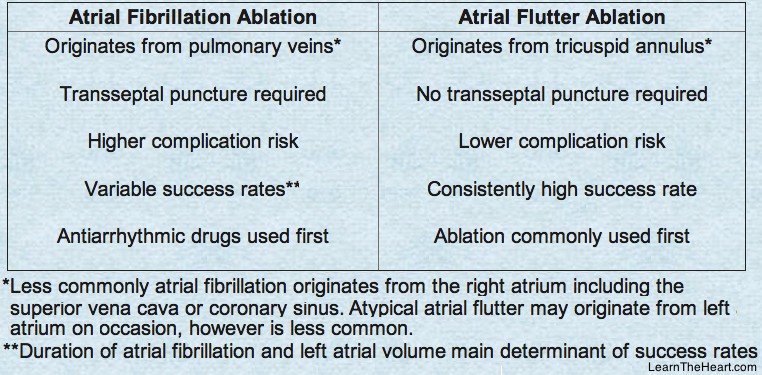

Neither of the atrial flutter RCTs reported freedom from arrhythmia at 12 months. For atrial flutter, freedom from arrhythmia at 12 months in case series ranged from 85% to 92% with a weighted mean of 88%. Cardiac tamponade and pulmonary vein stenosis were the most frequently recorded complications. Mortality rates were low in both RCTs and case series. Adverse events and complications were generally rare. The available RCTs provided insufficient evidence to determine the effectiveness of RFCA beyond 12 months or in patients with persistent or permanent AF. Single RCTs also suggested superiority of RFCA over electrical cardioversion followed by long-term AAD therapy and of RFCA plus AAD therapy over AAD maintenance therapy alone in drug-refractory patients. Three RCTs suggested that RFCA is more effective than long-term AAD therapy in patients with drug-refractory paroxysmal AF. For atrial fibrillation, freedom from arrhythmia at 12 months in case series ranged from 28% to 85.3% with a weighted mean of 76%. Two controlled studies and 23 case series of typical atrial flutter were included. Of these, eight controlled studies and 53 case series of AF were included. RESULTSĪ total of 4858 studies were retrieved for the review of clinical effectiveness. Decision uncertainty associated with this analysis was presented and used to inform future research priorities using the value of information analysis. This was used to estimate the cost-effectiveness of RFCA in terms of cost per quality-adjusted life-year (QALY) under a range of assumptions. A decision model was developed to evaluate a strategy of RFCA compared with long-term antiarrhythmic drug (AAD) treatment alone in adults with paroxysmal AF. The quality of the included studies was assessed using standard methods. Systematic reviews of clinical studies and economic evaluations of catheter ablation for AF and typical atrial flutter were conducted. For the review of cost-effectiveness a broad range of studies was considered, including economic evaluations conducted alongside trials, modelling studies and analyses of administrative databases.
#ATRIAL FLUTTER ABLATION UPDATE#
DATA SOURCESįor the systematic reviews of clinical studies 25 bibliographic databases and internet sources were searched in July 2006, with subsequent update searches for controlled trials conducted in April 2007.

To determine the safety, clinical effectiveness and cost-effectiveness of radio frequency catheter ablation (RCFA) for the curative treatment of atrial fibrillation (AF) and typical atrial flutter.
#ATRIAL FLUTTER ABLATION PDF#
The full text of this issue is available as a PDF document from the Toolkit section on this page.


 0 kommentar(er)
0 kommentar(er)
